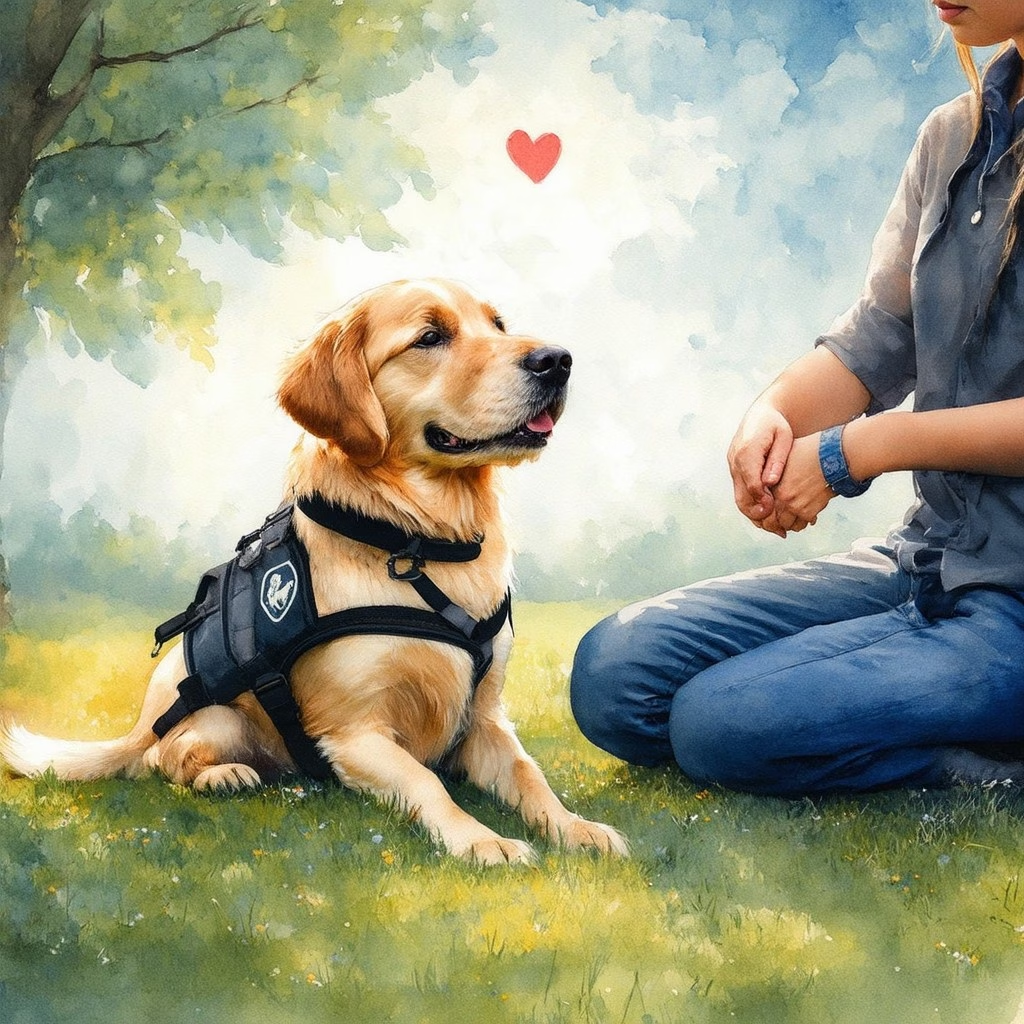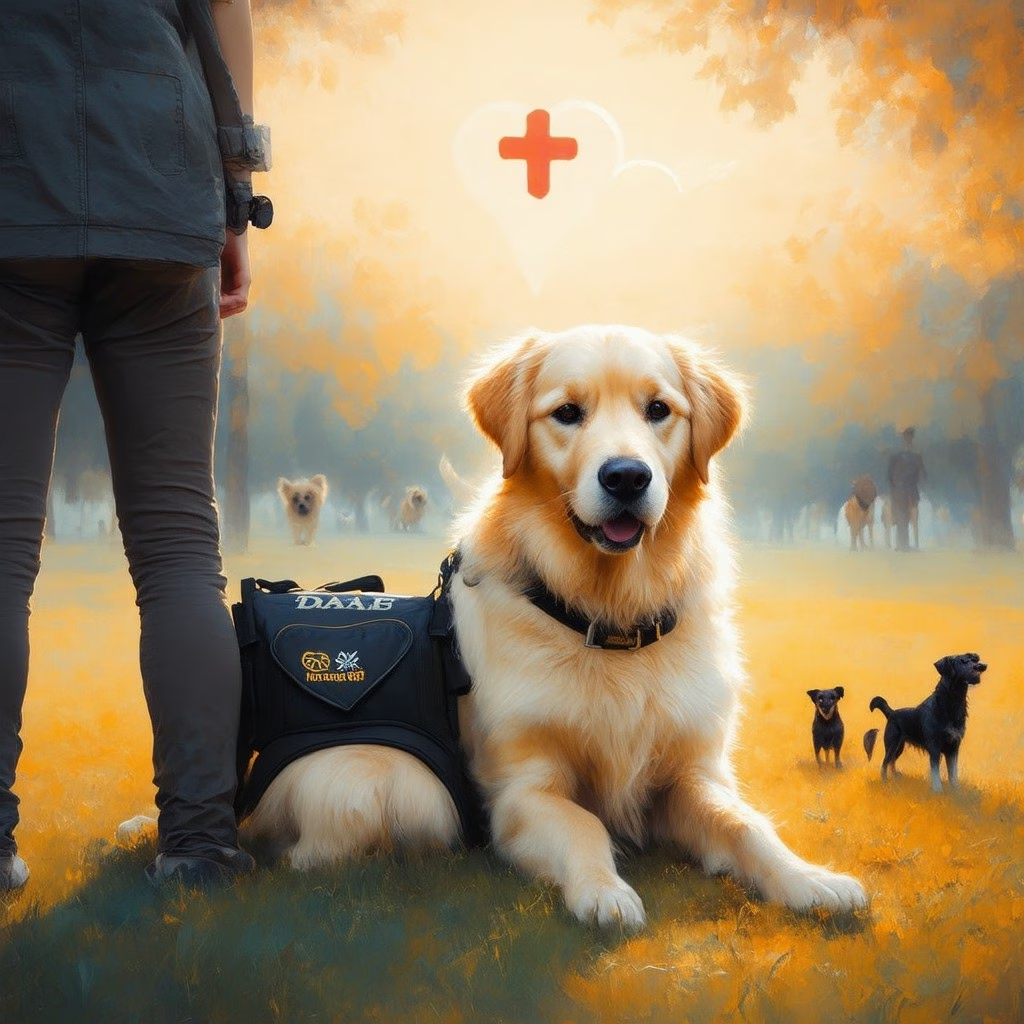Key Takeaways
- Service dogs are specifically trained to assist individuals with disabilities, including anxiety disorders, under the ADA’s legal definition.
- Common service dog breeds like Golden Retrievers and German Shepherds are known for their trainability and temperament, making them ideal companions.
- Legal rights under the ADA allow service dogs to accompany their handlers in public spaces, without the need for certification or registration.
- Understanding the training requirements and best practices for service dog training is essential for effective support.
- Documentation can enhance public understanding of your service dog’s role, although it is not legally required.
- Consulting with mental health professionals is crucial to determine the appropriateness of a service dog for managing anxiety and other conditions.
In recent years, the role of service dogs has gained significant attention, particularly for individuals managing anxiety and other conditions. Understanding what makes a dog a service dog is crucial for those considering this life-changing support. This article delves into essential insights on service dog breeds, the legal rights surrounding service dog certification, and the costs associated with obtaining a service dog. We will explore the medical conditions that qualify for a service dog, including how they assist in managing anxiety disorders. Additionally, we will address common questions such as how to prove your service dog’s status and the best practices for service dog training. Whether you are looking to understand the financial commitment involved or seeking local training options, this comprehensive guide will equip you with the knowledge needed to navigate the world of service dogs effectively.
Understanding the Definition of a Service Dog
A service dog is defined by its training and the specific tasks it performs to assist individuals with disabilities. Under the Americans with Disabilities Act (ADA), the following criteria distinguish a service dog from a pet:
- Task-Oriented Training: Service dogs are trained to perform specific tasks that directly mitigate their handler’s disability. This can include guiding individuals who are visually impaired, alerting those who are deaf, pulling a wheelchair, or providing support during a seizure.
- Professional vs. Owner Training: While many service dogs undergo professional training programs, some may be trained by their owners. Regardless of the training source, the tasks must be directly related to the handler’s disability.
- Legal Definition: According to the ADA, only dogs are recognized as service animals. Other animals, including emotional support animals, do not qualify under this definition, even if they provide comfort.
- Public Access Rights: Service dogs are allowed to accompany their handlers in public places where pets are typically prohibited, such as restaurants, hotels, and public transportation.
- Documentation and Certification: While there is no official certification process for service dogs, handlers may choose to carry documentation that outlines the dog’s training and the nature of the disability. This can help clarify the dog’s role in public settings.
- Behavioral Standards: Service dogs must be well-behaved in public and under control at all times. This includes being house-trained and not exhibiting aggressive behavior.
For more information on service dogs and their roles, you can refer to the ADA National Network and the American Kennel Club, which provide comprehensive resources on service animal laws and training standards.
Service Dog Breeds: Which Dogs Are Best for Service Work?
When considering which breeds make the best service dogs, several factors come into play, including temperament, size, and trainability. Here are some of the most commonly recognized service dog breeds:
- Golden Retriever: Known for their friendly nature and intelligence, Golden Retrievers excel in various service roles, including as psychiatric service dogs.
- German Shepherd: Often used in police and military roles, German Shepherds are highly trainable and protective, making them excellent service dogs.
- Labrador Retriever: Labradors are known for their gentle disposition and eagerness to please, making them ideal for service work.
- Poodle: Available in standard, miniature, and toy sizes, Poodles are intelligent and hypoallergenic, suitable for various service tasks.
- Boxer: Boxers are energetic and loyal, often serving as service dogs for individuals with mobility challenges.
Choosing the right breed is essential for ensuring that the service dog can effectively meet the specific needs of its handler. For more insights on service dog breeds and their unique characteristics, explore our blog.

Legal Rights and Regulations Surrounding Service Dogs
Understanding the legal framework surrounding service dogs is essential for both handlers and the general public. In Indiana, you cannot legally ask for proof of a service dog. According to the Americans with Disabilities Act (ADA), service animals are defined as dogs that are individually trained to perform tasks for individuals with disabilities. The ADA does not require service animals to be registered, certified, or licensed, and businesses cannot ask for documentation or proof of training.
However, it is important to note that you may ask two specific questions to determine if a dog is a service animal:
- Is the dog a service animal required because of a disability?
- What work or task has the dog been trained to perform?
These inquiries are designed to protect the rights of individuals with disabilities while ensuring that the service animal is legitimate. For further information, you can refer to the ADA National Network and the Indiana state laws regarding service animals, which align with federal regulations. Understanding these guidelines is crucial for both service animal handlers and the public to foster an inclusive environment.
Service Dog Certification: What You Need to Know
While the ADA does not mandate service dog certification, many handlers seek certification for various reasons, including travel and public access. A service dog certificate can provide additional assurance to businesses and the public about the legitimacy of the service dog. However, it is essential to understand that certification does not equate to legal recognition; it is merely a tool for convenience.
Handlers should be cautious about the sources of certification, as some organizations may charge fees without providing genuine value. Always look for reputable organizations that adhere to the standards set forth by the ADA. Additionally, keep in mind that a service dog vest can help identify your dog as a service animal, but it is not a legal requirement. Ultimately, the focus should remain on the tasks the dog is trained to perform, which is the core of what defines a service dog.
Understanding the Definition of a Service Dog
A service dog is specifically trained to perform tasks that assist individuals with disabilities. According to the Americans with Disabilities Act (ADA), these dogs are not just pets; they are working animals that provide essential support to their handlers. The tasks they perform must be directly related to the individual’s disability, which can range from physical impairments to mental health conditions.
Common tasks performed by service dogs include guiding individuals who are blind, alerting those who are deaf, pulling wheelchairs, and providing stability for individuals with mobility challenges. Additionally, service dogs can assist with psychiatric conditions, such as anxiety and PTSD, by providing emotional support and grounding techniques during episodes of distress.
To qualify as a service dog, the animal must undergo rigorous training and meet specific service dog certification requirements. This ensures that the dog can effectively assist its handler in various situations, making them invaluable companions for those in need.
Service Dog Breeds: Which Dogs Are Best for Service Work?
When considering a service dog, the breed can significantly impact the effectiveness of the animal in performing necessary tasks. Some breeds are naturally more suited for service work due to their temperament, intelligence, and trainability. Popular service dog breeds include:
- Golden Retrievers: Known for their friendly disposition and intelligence, they excel in various service roles.
- Labrador Retrievers: Highly trainable and eager to please, they are often used as guide dogs and therapy animals.
- German Shepherds: Renowned for their loyalty and protective instincts, they are commonly used in police and military roles, as well as service work.
- Poodles: Their intelligence and hypoallergenic coat make them a great choice for individuals with allergies.
- Boxers: Their playful nature and strong build can be beneficial for individuals needing physical support.
Choosing the right breed is crucial, as it can affect the dog’s ability to perform specific service dog tasks. Additionally, training programs such as service dog training schools can help ensure that the selected breed is well-prepared for its role.
What Diagnosis Qualifies for a Service Dog?
Understanding the medical conditions that qualify for a service dog is crucial for those seeking assistance. Service dogs are not just companions; they are trained to perform specific tasks that help individuals with disabilities, including various mental health conditions. Here’s a detailed overview of what qualifies someone for a service dog.
Understanding the Medical Conditions That Qualify for a Service Dog
Yes, anxiety can qualify for a service dog, but there are specific criteria and considerations involved. Here’s a detailed overview:
- Understanding Service Dogs: Service dogs are trained to perform specific tasks that assist individuals with disabilities, including mental health conditions like anxiety. The Americans with Disabilities Act (ADA) defines a service dog as a dog that is individually trained to do work or perform tasks for a person with a disability.
- Eligibility Criteria: To qualify for a service dog for anxiety, the individual must have a diagnosed anxiety disorder that significantly impairs their daily functioning. This can include conditions such as Generalized Anxiety Disorder (GAD), Panic Disorder, or Social Anxiety Disorder. A mental health professional must provide documentation of the diagnosis.
- Role of the Service Dog: Service dogs can help mitigate anxiety symptoms by performing tasks such as:
- Providing deep pressure therapy during panic attacks.
- Interrupting harmful behaviors (e.g., self-harm).
- Offering companionship and emotional support in stressful situations.
- Guiding individuals away from anxiety-inducing environments.
- Training Requirements: Service dogs must undergo extensive training to ensure they can perform their tasks reliably. This training typically includes socialization, obedience, and specific task training tailored to the handler’s needs. Organizations like the International Association of Assistance Dog Partners provide resources for training and certification.
- Consultation with Professionals: It’s crucial to work closely with mental health professionals to determine if a service dog is appropriate for your situation. They can help assess the severity of your anxiety and discuss alternative coping strategies, such as therapy or medication, which may be more suitable depending on individual circumstances.
- Legal Considerations: While the ADA provides guidelines for service dogs, laws can vary by state regarding emotional support animals (ESAs) and therapy dogs. It’s essential to understand the legal distinctions and rights associated with service dogs versus ESAs.
- Additional Support: For individuals seeking further assistance, wellness coaching can complement the use of a service dog by providing strategies for managing anxiety and improving overall mental health. Coaches can offer personalized plans that integrate coping techniques, lifestyle changes, and support systems.
In conclusion, while anxiety can qualify for a service dog, it is essential to evaluate the necessity and effectiveness of such an intervention with professional guidance. For more information, consult resources from the ADA and mental health organizations.
Service Dogs for Anxiety: How They Help
Service dogs play a pivotal role in managing anxiety disorders, providing both emotional support and practical assistance. Here are some key ways in which service dogs help individuals with anxiety:
- Task Performance: Service dogs are trained to perform specific tasks that directly address the needs of their handlers. For example, they can provide deep pressure therapy, which helps calm individuals during anxiety attacks.
- Emotional Support: The presence of a service dog can significantly reduce feelings of isolation and fear, offering companionship and a sense of security.
- Behavioral Interruption: Service dogs can be trained to interrupt harmful behaviors associated with anxiety, such as self-harm or excessive panic responses.
- Social Facilitation: Having a service dog can make social interactions easier, as they can serve as a bridge for communication and help reduce anxiety in public settings.
Understanding the specific tasks that service dogs can perform is essential for those considering this option for managing anxiety. For more insights on service dog training and resources, check out our blog on service dogs.

How do people prove they have a service dog?
Proving they have a service dog involves understanding the legal framework surrounding service animals, particularly under the Americans with Disabilities Act (ADA) and relevant state laws. Here are key points to consider:
- No Registration Required: Under the ADA, service dogs are not required to be registered or wear special identification tags or vests. This means that individuals cannot be asked for proof of certification or registration.
- Definition of Service Dog: A service dog is defined as a dog that has been individually trained to perform tasks for a person with a disability. This can include guiding individuals who are blind, alerting those who are deaf, pulling a wheelchair, or providing support during a seizure.
- Inquiries Allowed: When it comes to public access, businesses and organizations are allowed to ask only two questions:
- Is the dog a service animal required because of a disability?
- What work or task has the dog been trained to perform?
They cannot ask about the person’s disability or request documentation.
- State-Specific Regulations: Some states, like California, have additional laws that may allow for local animal control departments to issue identification tags for service animals. While not required, these tags can help in certain situations.
- Documentation and Training: While not legally required, having documentation from a trainer or organization that outlines the dog’s training can be beneficial. This can include certificates or letters from recognized service dog training programs.
- Public Awareness and Education: It is essential for individuals with service dogs to educate the public about their rights and the role of service animals. Resources from organizations such as the ADA National Network can provide valuable information.
Service Dog Registration: Is It Necessary?
When considering service dog registration, it’s important to understand that while it is not legally required, many individuals opt for it to facilitate access and acceptance in public spaces. Here are some insights:
- Voluntary Registration: Some organizations offer service dog registration, which can provide a sense of legitimacy and help in situations where proof of service dog status is questioned. However, this does not replace the legal definitions set by the ADA.
- Service Dog Certificate: Obtaining a service dog certificate can be beneficial for individuals who want to have documentation of their dog’s training. This can be especially useful in states with specific regulations regarding service animals.
- Benefits of Registration: While not mandatory, having a service dog vest or harness with identification can help reduce misunderstandings in public settings. It signals to others that the dog is working and should not be distracted.
- Choosing a Registration Service: If you decide to pursue registration, ensure that you select a reputable organization. Resources like the Service Dog Certifications can provide guidance on the process.
Service Dog Training: Best Practices and Resources
Training a service dog is a crucial step in ensuring they can effectively assist their handlers. The training process involves teaching specific tasks that cater to the unique needs of individuals with disabilities. Here are some best practices to consider when embarking on this journey:
Finding Service Dog Training Near Me: Local Options and Considerations
When searching for service dog training options, it’s essential to look for accredited trainers or training schools that specialize in service dog education. Local options may include:
- Professional Training Schools: Look for service dog training schools that are recognized for their expertise in training various service dog breeds.
- Community Programs: Many communities offer programs through local animal shelters or non-profit organizations that focus on training service dogs for veterans or individuals with disabilities.
- Online Resources: Websites like the Freedom Service Dogs provide valuable information and resources for training service dogs.
Additionally, consider the service dog certification process, which can help validate your dog’s status and training. This can be beneficial in public settings where proof of service dog status may be required.
Service Dog Training School International: A Global Perspective
For those looking for a broader perspective, international service dog training schools offer diverse methodologies and training techniques. These schools often incorporate various training styles that can be beneficial for specific needs:
- Specialized Training: Some international programs focus on training dogs for specific tasks, such as service dogs for anxiety or psychiatric service dogs.
- Cross-Cultural Techniques: Learning from different training philosophies can enhance your understanding of effective methods for training service dogs.
- Networking Opportunities: Engaging with international trainers can provide insights into best practices and innovative training techniques.
Investing in quality training is vital for the success of a service dog. By exploring local and international options, you can find the right resources to ensure your service dog is well-prepared to assist you in your daily life.
Service Dog Training: Best Practices and Resources
Training a service dog is a crucial step in ensuring they can perform their designated tasks effectively. The training process not only helps the dog learn specific commands but also fosters a strong bond between the handler and the dog. Here, we will explore the best practices for service dog training and highlight valuable resources available for aspiring service dog handlers.
Finding Service Dog Training Near Me: Local Options and Considerations
When searching for service dog training options, it’s essential to consider local facilities that specialize in training service dogs. Look for trainers who are experienced in working with various service dog breeds and understand the specific needs of service dogs for conditions like anxiety or ADHD. Here are some key factors to consider:
- Certification: Ensure the training program is recognized and adheres to established standards for service dog training.
- Experience: Choose trainers with a proven track record in training service dogs, particularly those who have experience with psychiatric service dogs.
- Training Methods: Look for positive reinforcement training methods, which are effective and humane.
- Reviews and Testimonials: Research feedback from previous clients to gauge the effectiveness of the training program.
Local options can often be found through community resources, veterinary offices, or online searches for service dog training near me. Additionally, organizations like Freedom Service Dogs provide valuable training resources and support.
Service Dog Training School International: A Global Perspective
For those interested in a broader perspective on service dog training, international training schools offer unique insights and methodologies. These schools often incorporate diverse training techniques and cater to various service dog certification requirements across different countries, including service dog certification Germany and service dog Deutschland.
International training schools can provide:
- Cross-Cultural Techniques: Exposure to different training philosophies and practices that may enhance your understanding of service dog training.
- Networking Opportunities: Connections with trainers and handlers from around the world, fostering a community of support.
- Comprehensive Programs: Access to specialized programs that may not be available locally, including advanced training for specific tasks.
Whether you choose a local training facility or an international school, investing in quality training is essential for the success of your service dog. Proper training not only equips your dog with the necessary skills but also ensures compliance with ADA service dog regulations, enhancing the overall experience for both the handler and the service dog.












